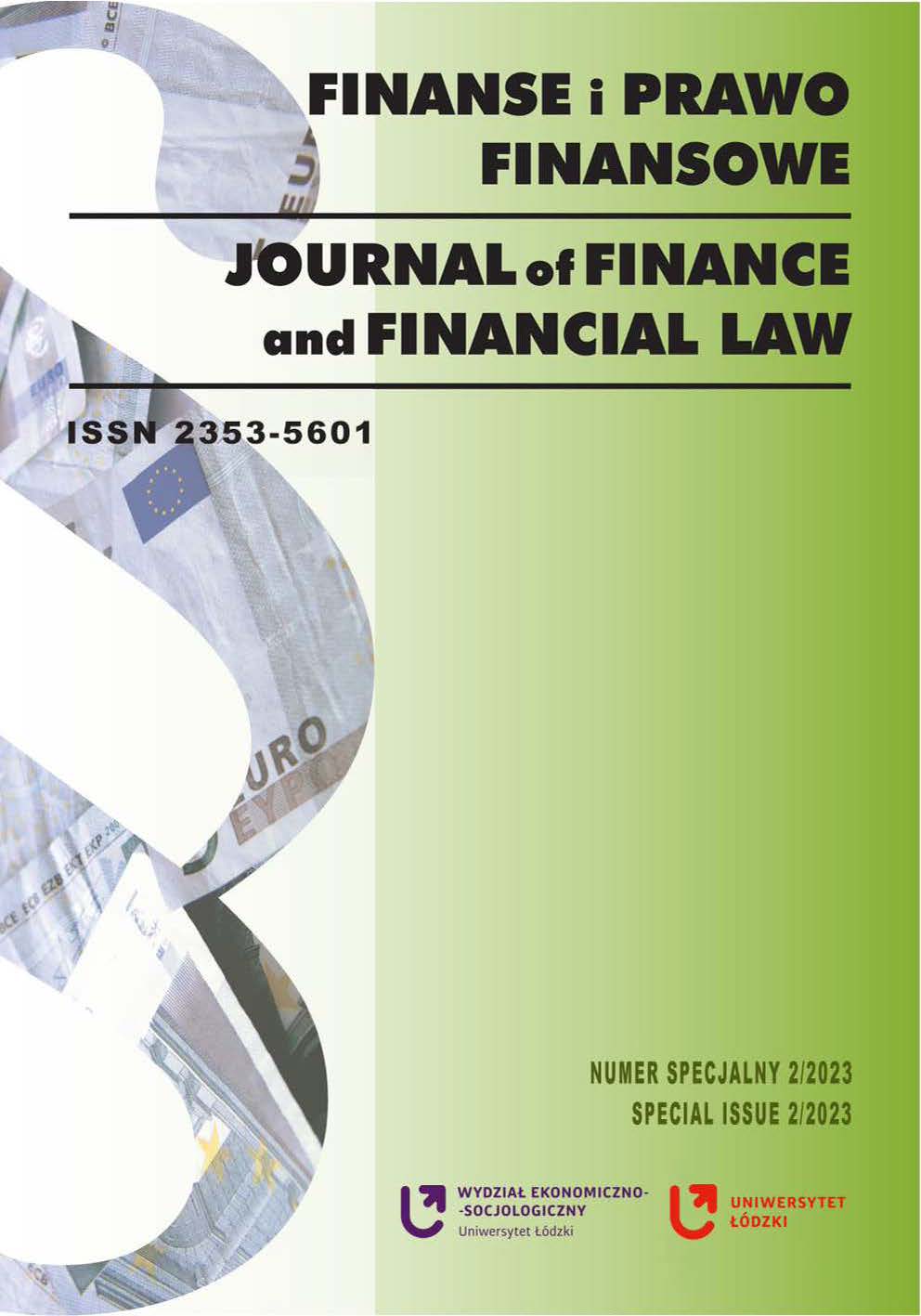Irregularities in Consumer Credit Agreements in Poland, the Contex of Consumer Protection in the Financial Services Market
DOI:
https://doi.org/10.18778/2391-6478.S2.2023.10Keywords:
COVID-19 pandemic, consumer credit, irregularities, consumer protectionAbstract
The purpose of the article and the research question. The aim of the article is to present and evaluate the functioning of the banking market in Poland from the perspective of the safety of banking services related to consumer protection. The realisation of the objective was limited to consumer credit market and the irregularities identified by consumer protection institutions during the COVID-19 pandemic.
The article poses the research questions: What measures have been taken by the government and the banking sector to protect consumers from the consequences of the COVID-19 pandemic? Which institutions are part of the system of consumer protection on the banking services market? What irregularities were reported by borrowers in the banking sector?
Methodology. The research focused on the literature review, regulations introduced in relation to the COVID-19 pandemic and data on rulings issued by the Banking Ombudsman and the Office of Competition and Consumer Protection related to banking market failures against consumers.
Results of the research. It has been found that “Credit holidays” were a way of protecting the financial situation of consumers/borrowers during the COVID-19 pandemic, when they lost their jobs or their source of income. Customers reported irregularities to: Financial Ombudsman, Office of Competition and Consumer Protection and Bank Arbitrator. The large number of credit offers, their high level of complexity and the low impact on the credit agreement meant that the consumer was exposed to unfair and unethical practices of creditors. Irregularities occurred both at the pre-contractual stage and during and after the credit agreement.
Downloads
References
Biała, E. (2022). Rynek niebankowych instytucji pożyczkowych a ochrona konsumenta w Polsce. Warszawa: Biblioteka UOKiK, Urząd Ochrony Konkurencji i Konsumentów.
Google Scholar
Chlipała, P. i Żbikowska, A. (2022). Konsumpcja w czasach pandemii. Jak kryzys spowodowany pandemią COVID-19 zmienił zachowania konsumentów? Warszawa: Polskie Wydawnictwo Ekonomiczne.
Google Scholar
Czechowska, I.D. (2017). Architektura bezpieczeństwa i ochrony interesów konsumentów rynków finansowych. W: Ubezpieczenia i finanse. Rozwój i perspektywy. Łódź: Wydawnictwo Uniwersytetu Łódzkiego, s. 40–44.
Google Scholar
DOI: https://doi.org/10.18778/8088-628-5.03
Decyzja NR RKR – 7(2020). Prezes Urzędu Ochrony Konkurencji i Konsumentów, T. Chróstny, Kraków.
Google Scholar
European Banking Authority. (2020). Guidelines on legislative and non-legislative moratoria on loan repayments applied in the light of the COVID-19 crisis, https://www.eba.eu-ropa.eu/sites/default/documents/files/document_library/Publications/Guide-lines/2020/Guidelines%20on%20legislative%20and%20non-legislative%20moratoria%20on%20loan%20repayments%20ap-plied%20in%20the%20light%20of%20the%20COVID-19%20crisis/882537/EBA-GL-2020-02%20Guidelines%20on%20payment%20moratoria.pdf [downloaded 12.06.2023].
Google Scholar
Hajder, K., Kacperska, M. i Donaj, Ł., red. (2020). Konsekwencje pandemii COVID-19 świat i gospodarka. Poznań: Wydawnictwo Naukowe Wydziału Nauk Politycznych i Dziennikarstwa.
Google Scholar
Kalemli-Ozcan, S., Papaioannou, E., and Perri, F. (2013). Global banks and crisis transmission. Journal of international Economics, no. 89(2), pp. 495–510.
Google Scholar
DOI: https://doi.org/10.1016/j.jinteco.2012.07.001
Kosman, J. i Kosman, M. (2021). Polityka Narodowego Banku Polskiego w zakresie stóp procentowych wobec pierwszej fali pandemii COVID-19. Świat Idei i Polityki, vol. 20, nr 2, https://doi.org/10.34767/SIIP.2021.02.08
Google Scholar
Lament, M. i Bukowska, J., red. (2021). Gospodarka XXI wieku wyznania sektorowe, Warszawa: CeDeWu.
Google Scholar
Markowiak, M. (2022). Ocena działań Narodowego Banku Polskiego podczas pandemii koronawirusa. Gdańsk: Zeszyty Studenckie „Nasze Studia”, nr 12.
Google Scholar
Mroczyński-Szmaj, Ł. (2021). Realizacja konstytucyjnej gwarancji bezpieczeństwa konsumenta przez władze publiczne w dobie Covid-19 na rynku usług finansowych i rynku energii. Zagadnienia wybrane. Acta Iuridica Resoviensia, no. 3(34), https://doi.org/10.15584/actai-res.2021.3.17
Google Scholar
DOI: https://doi.org/10.15584/actaires.2021.3.17
NBP (2017). Financial system in Poland 2016. Warsaw.
Google Scholar
Niczyporuk, P. (2021). Przywilej dla kredytobiorców w postaci tzw. wakacji kredytowych w okresie pandemii koronawirusa (Covid-19) – wybrane zagadnienia. Studia Iuridica, nr 88, https://doi.org/10.31338/2544-3135.si.2021-88.14
Google Scholar
DOI: https://doi.org/10.31338/2544-3135.si.2021-88.14
Nowak, P. (2019). Ochrona konsumenta przez ustawowe limitowanie opłat kredytowych. Kraków: Uniwersytet Pedagogiczny w Krakowie.
Google Scholar
DOI: https://doi.org/10.24917/3296.151.17
Pawłowska-Szawara, E. (2020). Asymetria informacji na rynku bankowych kredytów konsumenckich w Polsce. Warszawa: Difin SA.
Google Scholar
Polski Instytut Ekonomiczny. (2021). Tarcza antykryzysowa. Koło ratunkowe dla firm i gospodarki? Warszawa.
Google Scholar
Rutkowska-Tomaszewska, E. i Zwaliński, A. (2021). Umowne i ustawowe rozwiązania dotyczące „wakacji kredytowych” w sytuacji pandemii COVID-19. Prawo – praktyka – a rzeczywista ochrona kredytobiorcy konsumenta. Internetowy Kwartalnik Antymonopolowy i Regulacyjny nr 7(10), https://doi.org/10.7172/2299-5749.IKAR.7.10.7
Google Scholar
Rzecznik Finansowy, „Wakacje kredytowe” – podsumowanie problematyki i działań podjętych przez Rzecznika Finansowego, https://rf.gov.pl/wakacje-kredytowe-podsumowanie-problematyki-i-dzialan-podjetych-przez-rzecznika-finansowego/ [downloaded 07.06.2023].
Google Scholar
Sagan, B. (2016). Ochrona konsumenta w umowach zawieranych na odległość (zarys problemu). Nierówności Społeczne a Wzrost Gospodarczy, nr 45.
Google Scholar
DOI: https://doi.org/10.15584/nsawg.2016.1.8
Serzysko, A. (2021). Klauzule umowne w umowach bankowych a COVID-19, LEX/el.
Google Scholar
Ustawa z dnia 12 maja 2011 r. o kredycie konsumenckim, Dz.U. 2022, poz. 246, 2339.
Google Scholar
Ustawa z dnia 19 czerwca 2020 r. o dopłatach do oprocentowania kredytów bankowych udzielanych przedsiębiorcom dotkniętym skutkami COVID-19 oraz o uproszczonym postępowaniu o zatwierdzenie układu w związku z wystąpieniem COVID-19, Dz.U. 2020, poz. 1086 z późn. zm.
Google Scholar
Uścińska, G. (2021). Rozwiązania ukierunkowane na przeciwdziałanie skutkom pandemii COVID-19 w zakresie bezpieczeństwa socjalnego obywateli w wybranych programach rządowych. Zabezpieczenie społeczne. Teoria, prawo, praktyka, no. 13.
Google Scholar
World Health Organization (2020). Coronavirus disease 2019 (COVID-19), Situation Report, no. 82.
Google Scholar
[www.1] www.bfg.pl [downloaded 12.06.2023].
Google Scholar
[www.2] www.ufg.pl [downloaded 12.06.2023].
Google Scholar
[www.3] www.knf.gov.pl [downloaded12.06.2023].
Google Scholar
[www.4] www.rf.gov.pl [downloaded 13.06.2023].
Google Scholar
[www.5] www.zbp.pl [downloaded 14.06.2023].
Google Scholar
[www.6] www.zbp.pl/dla-klientow/arbiter-bankowy [downloaded, 14.06.2023].
Google Scholar
Związek Banków Polskich (2020). Komunikat ZBP w sprawie działań pomocowych podejmowanych przez banki w związku z pandemią koronawirusa COVID 19, https://www.zbp.pl/Aktualnosci/Wydarzenia/Komunikat-ZBP-w-sprawie-dzialan-pomocowych-podejmowanych-przez-banki [downloaded 12.06.2023].
Google Scholar
Downloads
Published
How to Cite
Issue
Section
License

This work is licensed under a Creative Commons Attribution-NonCommercial-NoDerivatives 4.0 International License.














